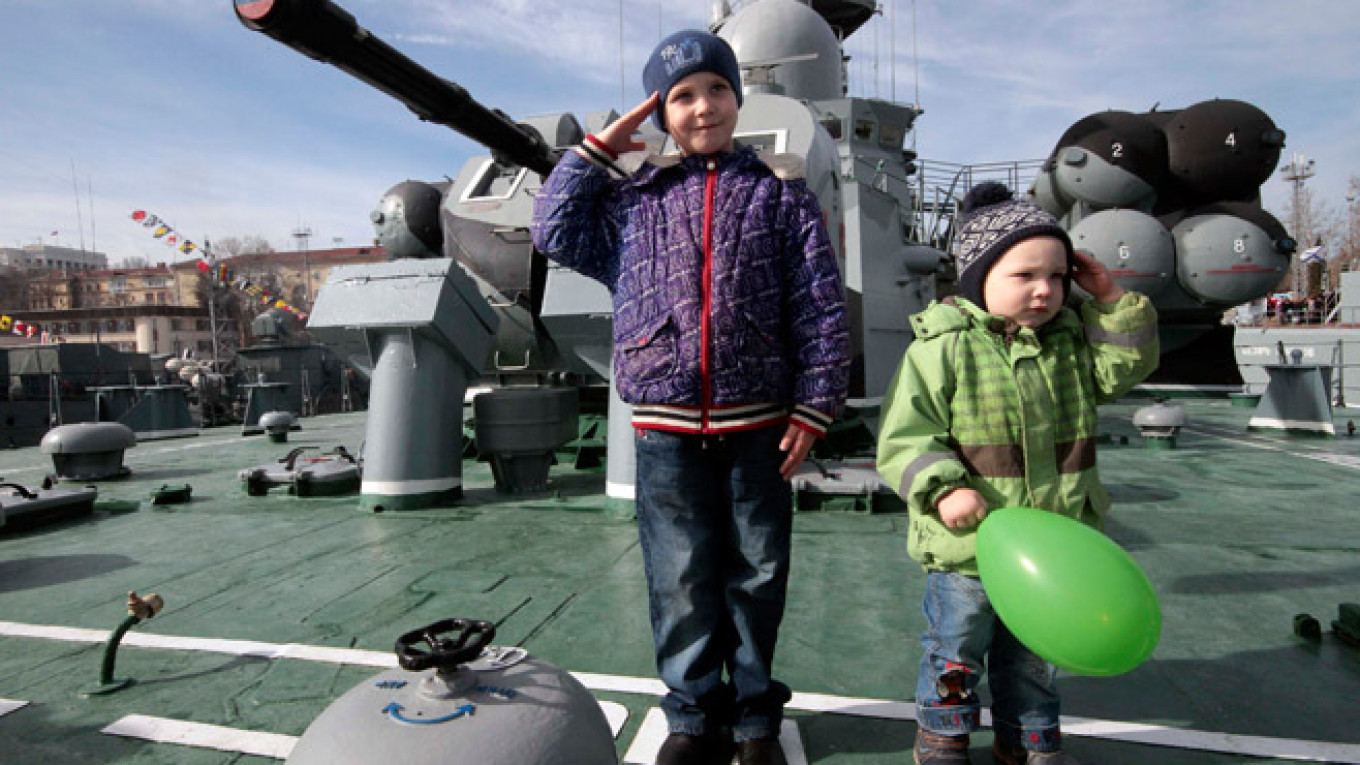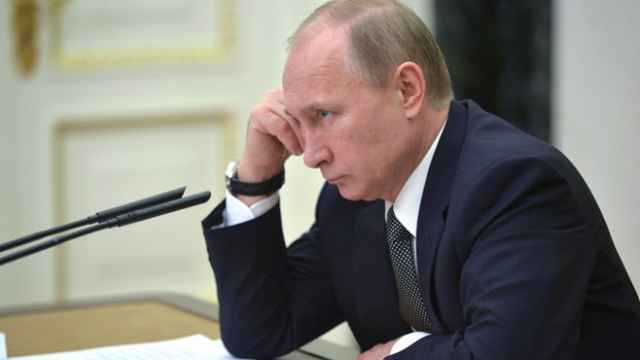YALTA, Crimea — A year after Russia annexed their peninsula from Ukraine, Crimeans are overwhelmingly upbeat about their future despite the challenges inherent to the process of severing ties with one nation and integrating into another.
In the immediate aftermath of the annexation, many residents of Russia's newest region were predictably apprehensive. Particularly among the Crimean Tatar population, the move was seen as a return to a former autocratic master.
Today, the bulk of the peninsula's population interprets the events of February-March 2014 with cautious optimism.
In comments to The Moscow Times last week, Crimean residents complained of a range of hardships that have emerged in the past year, from soaring inflation rates to a host of strict new business regulations, and the even stricter enforcement thereof.
At the same time, many said these obstacles were a reasonable price to pay for the security that comes with being under Russia's control amid violent conflict between rebels and pro-Kiev forces in Ukraine's turbulent east.
"We chose the lesser of two evils. Look at what's happening in Ukraine right now; there is war and complete economic collapse. Anything is better than that," said Andrei Kurbatov, a Sevastopol businessman in the construction industry.
Burgeoning Optimism
At present, only four percent of Crimeans remain opposed to Russia's annexation of their peninsula, the Ukrainian division of pollster GfK revealed in a study released in early February.
A staggering 93 percent voiced support for the move, despite the fact that it has helped foster the worst crisis in Russian-Western relations in the post-Cold War era.
Asked about the most pressing concerns that loom over their everyday lives, some 42 percent of respondents to the GfK poll pointed to the armed conflict in east Ukraine. Inflation was named by 40 percent of respondents, and 22 percent chose isolation in terms of transportation into and out of the peninsula.
The poll — which was conducted by GfK in association with the Kiev-based Free Crimea center, which advocates for the peninsula's return to Ukrainian control — was conducted among 800 Crimeans, and had a margin of error not exceeding 3.5 percent.
Economy in Decline
These poll results were particularly surprising in that they emerged against the backdrop of a general economic downturn in Crimea.
The past year has taken a significant toll on purchasing power in the peninsula. Despite salaries having nominally surged by some 45 percent overall in 2014, they have shrunk by 8.5 percent in real terms due to rampant inflation rates, which have soared to 53.5 percent, the Vedomosti business daily reported in late February.
The average Crimean worker was earning a monthly salary of 21,619 rubles ($354) by the end of 2014, according to the regional branch of Russia's state statistics service.
The previous December, the average salary had stood at a comparatively meager 4,012 hryvnas ($164), according to Ukraine's State Statistic Service. The average salary across Ukraine has declined to 3,455 hryvnas per month ($141).
Traditionally a hot spot for spring and summer beach vacations, Crimea's tourism industry has taken a severe beating since the peninsula returned to the federal fold. The total number of incoming tourists has decreased by half.
Construction, a key pillar of the regional economy, has likewise declined by 34.2 percent, according to the regional statistics service.
Regional Diversity
Crimea is a spectacularly diverse region, bursting with Crimean Tatars, boisterous Cossacks, hardened sailors and paratroopers and everything in between. The popular resort towns of Yalta, Alusha and Yevpatoria are generally pro-Russian, while Ukrainians in the northern reaches of the peninsula tend to be more Moscow-wary.
Many signposts remain in the Ukrainian language in Bakhchisaray, the ancient capital of the Crimean khanate, which controlled much of the peninsula for more than three centuries before it became a conquest of the Russian Empire in 1783.
The welcome sign in front of Hansaray, the palace of the Tatar Khan, still reads that the museum is located in Ukraine, and most of the surrounding cafes and restaurants have Ukrainian television channels broadcasting on their flat screens via satellite.
In Sevastopol all evidence of Ukrainian rule have been scraped clean, while in Yalta many historic plaques and signposts featuring the Ukrainian coat of arms have been covered with paint.
In Bakhchisaray, Russian flags can only be found on government buildings.
People on the streets in Bakhchisaray refused to speak with The Moscow Times, and appeared nervous when approached for interviews.
Crimean Tatars are united by a deep sense of community that was forged by the perils of their common past. In 1944, some 230,000 Crimean Tatars were deported to Uzbekistan on the orders of Soviet leader Josef Stalin.
The forced exodus, which claimed more than 100,000 lives, has become the backbone of the Crimean Tatar identity, and serves as the basis of their resentment toward Kremlin rule.
In Ukraine, Crimean Tatars occupied a privileged status as the peninsula's indigenous population.
In the past year, four leaders of the Mejlis of the Crimean Tatar People — their representative body — have been denied entry into the peninsula, and many other members have reported harassment at the hands of regional security services. The Mejlis refers to Crimea's current position as under Russian occupation.
The Russian government has integrated select members of the Mejlis into the local power structures, but these individuals have faced the condemnation of the body's central authorities.
"We will not talk to you because we know that all our words will be twisted around," a middle-aged man said in Bakhchisaray upon learning that The Moscow Times is based in Moscow.
Others approached on the street refused to say anything at all.
Crimean Tatars currently represent approximately 14 percent of the overall Crimean population.
Local Business Hardships
For the majority of Crimeans, the past year has been marked not by ethnic strife, but by a struggle to adapt to new bureaucratic and economic realities.
For many local businesses, life has become much more difficult: Russian regulations are significantly stricter, particularly for small retail enterprises. Many Crimeans have faced hardship in the form of increased competition from a flurry of new Russian businesses, and have lost the connections they formerly enjoyed with Ukrainian government officials.
"What happened is that people from all over Russia came to Crimea: from the Rostov, Krasnodar and Stavropol regions especially. Also, people from Chechnya have become a very prominent business force in Yalta," said Sergei Andronov, owner of a small shop in Yalta.
"In addition, many people used to enjoy informal links to officials in the Ukrainian tax service, or other agencies. Now these have all been lost," he said.
Another big challenge is Crimea's geographic isolation. The new border with Ukraine is cumbersome, and ferry access to Russia is relatively limited Only one daily passenger train now departs the Simferopol railway terminal, which used to be bursting of traffic.
This isolation has contributed to spiraling inflation.
"Bringing products to Crimea is like bringing them to Kamchatka now," Oleg, a manager of the Stary Amsterdam cheese store in Yalta said.
In addition, national Russian retailers remain apprehensive of entering Crimea. "Many owners of big Russian retail companies are afraid of sanctions," Alexei Chaly, chairman of Sevastopol's Legislative Assembly, told journalists during a news conference in Moscow on Feb. 20.
Big Money to Arrive
In light of all these troubles, why are Crimeans still so adamantly optimistic about becoming Russian? Perhaps the answer lies in a recent federal initiative set to pump the peninsula full of cash.
Last August the Russian government passed a federal program aimed at fostering rapid development in the peninsula, which envisaged investments in the peninsula's battered infrastructure.
The program allocated 677.7 billion rubles ($11.07 billion) to be invested into Crimea by 2020, including 247 billion ($4 billion) to be spent on a bridge spanning the Kerch Strait, in order to link what has effectively been reduced to an island to the Russian mainland.
"We thought that positive changes would arrive quickly, but in one year we haven't seen much," said Olga Proskurina, a resident of Yalta. "But most of us are prepared to hold out for longer," she said with a hint of optimism.
Contact the author at i.nechepurenko@imedia.ru
A Message from The Moscow Times:
Dear readers,
We are facing unprecedented challenges. Russia's Prosecutor General's Office has designated The Moscow Times as an "undesirable" organization, criminalizing our work and putting our staff at risk of prosecution. This follows our earlier unjust labeling as a "foreign agent."
These actions are direct attempts to silence independent journalism in Russia. The authorities claim our work "discredits the decisions of the Russian leadership." We see things differently: we strive to provide accurate, unbiased reporting on Russia.
We, the journalists of The Moscow Times, refuse to be silenced. But to continue our work, we need your help.
Your support, no matter how small, makes a world of difference. If you can, please support us monthly starting from just $2. It's quick to set up, and every contribution makes a significant impact.
By supporting The Moscow Times, you're defending open, independent journalism in the face of repression. Thank you for standing with us.
Remind me later.






